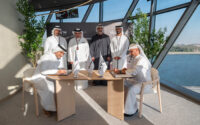Mohammed Bin Rashid Attends Indian Prime Minister’s Address On The Final Day Of The World Governments Summit 2024
His Highness Sheikh Mohammed bin Rashid Al Maktoum, Vice President and Prime Minister of the UAE and Ruler of Dubai, attended the main address delivered by His Excellency Shri Narendra Modi, Prime Minister of the Republic of India, a guest of honour at the World Governments Summit 2024, held in Dubai under the theme ‘Shaping Future Governments’.
Also attending the session were His Highness Sheikh Hamdan bin Mohammed bin Rashid Al Maktoum, Crown Prince of Dubai and Chairman of The Executive Council of Dubai; His Highness Sheikh Maktoum bin Mohammed bin Rashid Al Maktoum, First Deputy Ruler of Dubai, and Deputy Prime Minister and Minister of Finance of the UAE; and His Highness Sheikh Saif bin Zayed Al Nahyan, Deputy Prime Minister and Minister of the Interior.
The session was also attended byHis Highness Sheikh Hamed bin Zayed Al Nahyan; His Highness Sheikh Theyab bin Mohamed bin Zayed Al Nahyan, Chairman of the International Humanitarian and Philanthropic Council; His Highness Sheikh Mansoor bin Mohammed bin Rashid Al Maktoum, Chairman of the Dubai Ports and Borders Security Council; Her Highness Sheikha Latifa bint Mohammed bin Rashid Al Maktoum, Chairperson of the Dubai Culture and Arts Authority; His Excellency Sheikh Nahyan bin Mubarak Al Nahyan, Minister of Tolerance and Coexistence; anda number of senior officials.
At the beginning of his main address, the Indian Prime Minister expressed his gratitude to His Highness Sheikh Mohamed bin Zayed Al Nahyan, President of the UAE, whom he met with several times. Prime Minister Modi called him “Not only a Leader of Vision, but a Leader of Resolve, and a Leader of Commitment as well.”
Thanking His HighnessSheikh Mohammed bin Rashid Al Maktoum for inviting him to the summit, Prime Minister Narendra Modi commended His Highness’s visionary leadership which played a major role in Dubai becoming the world’s economic, commercial and technology epicentre. His Excellency highlighted the examples of Expo 2020 and COP28 as shining examples of the “Dubai story”.
Despite moving towards modernity in the 21st century, the world is facing extensive challenges in terms of food security, water security, health, energy, education, and inclusivity, said Modi. “Terrorism has been taking on new forms and is posing new challenges to mankind. Even climate related challenges are becoming bigger with the passage of time.”
“Given all these questions, challenges and circumstances, the World Governments Summit has even more significance,” he added.
Speaking about India’s experience during the COVID-19 pandemic, Modi said: “We often hear experts say that after the pandemic, people have less faith in their governments. But in India, people’s confidence in the government has increased, as they trust both the intent and commitment of the government, because we have accorded priority to the people’s aspirations in our governance.”
“In the past 10 years, India has lifted 250 million people out of poverty. When governments give priority to transparency, this gives positive results, and India is a good example of this. Today, more than 1.3 billion Indian citizens have a digital identity that is connected to people’s bank accounts, and to their mobile phones,” he explained.
On technology, Prime Minister Modi discussed how India utilised technology to develop a system of Direct Benefit Transfer, which made it possible for the government to root out any scope for corruption, thereby preventing $33 billion of the country’s money from falling into the wrong hands.
He highlighted his government’s focus on social and financial inclusion. The country has made great progress in fintech services and digital payments, ensuring that more than 500 million people joined the banking system following a large-scale awareness campaign for them, he said.
Touching upon the climate crisis, the Indian Prime Minister said: “As far as climate change is concerned, India has its own approach to deal with it. Along with solar, wind and hydroelectricity, India is also working on biofuels and green hydrogen. Our culture has taught us that we must try and give back to nature, whatever we have taken from it.”
“We all have our own governance related experiences. That is why, not only should we work together, but also learn from each other. And that is also the aim of this summit, as the solutions that emerge here will shape the world’s future,” he concluded.








 Email: info@cyber-gear.com
Email: info@cyber-gear.com